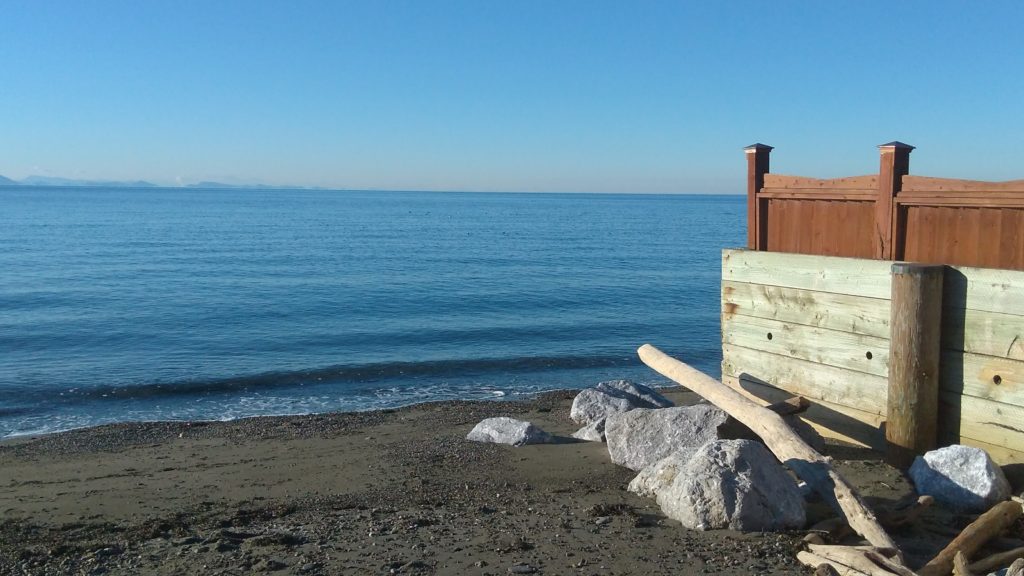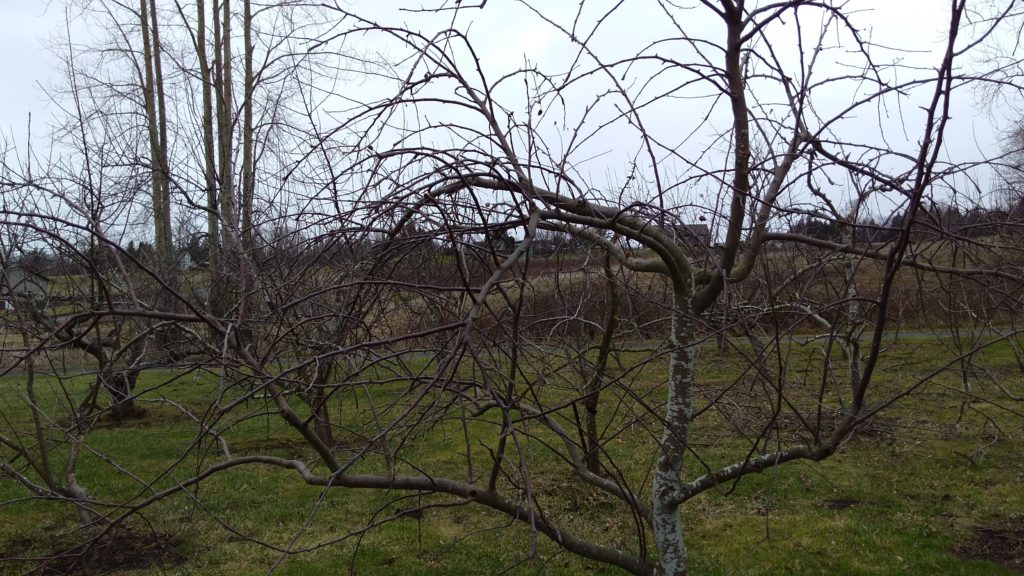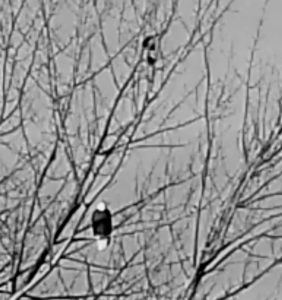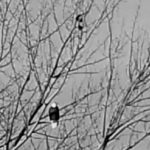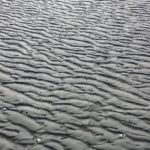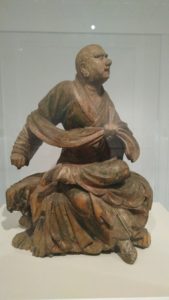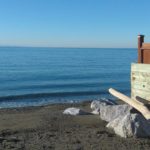
You have to pay close attention to all the beings you encounter, whether seen or unseen–sometimes both at once. They are openings.
Today for instance, the air is clear, cold and bright with blue movement from the water to the left and blue stretching infinitely above. I’ve been walking for some time, up the beach into the sun and now back down, crunching on the rocky layers mingled with crab shells, rocks and bright bits of seaweed.
Ahead on the beach, cold and a bit windy in the sparkling clear winter sun, is a small patch of yellow. At first, it seems to be some small recreational yellow boat propped up on the shore for the winter. As I walk, other components of this blob began to come into focus. It, too, is moving. As I watch, I begin to see the black lines of legs protruding from the bottom, carrying the yellow rectangle slowly away from me. I had been enjoying the solitude of the blue ocean, the blue sky, houses either shuttered for the season or uninhabited in the middle of the day. A bit of regret at the sighting. It seems to be moving slowly enough that I’ll overtake it.
I had been enjoying the solitude of the blue ocean, the blue sky, houses either shuttered for the season or uninhabited in the middle of the day. A bit of regret at the sighting. It seems to be moving slowly enough that I’ll overtake it.
As I continued my walk, the figure came slowly into focus. A yellow waterproof coat covered most of a small figure whose shoulders were curved forward and slightly to one side, the yellow hood pulled up to cover the head. This bundle moved slowly forward, pausing every so often, moving a bit toward the water and then back as it progressed, uneven. A small black and white dog appeared briefly as it ran past the yellow figure towards me and then away again.
I was coming quickly towards them. Closer up, I saw the profile of a woman’s face, sunglasses covering her eyes as she looked out towards the water, white woolen watchman’s cap under the hood. She turned again to walk before I was close enough to be a presence. As I began to overtake her, the dog spotted me from up ahead and began to run back. I sniffed and breathed heavily to alert her of my approach. As the dog passed her, I also began to overtake her and she turned, a bit startled, saying,
As I began to overtake her, the dog spotted me from up ahead and began to run back. I sniffed and breathed heavily to alert her of my approach. As the dog passed her, I also began to overtake her and she turned, a bit startled, saying,
“Oh! I wondered what that shadow was, falling on the beach! There you are.”
We both had stopped, she turning towards me on her right. I looked briefly to my left into a face somehow slightly twisted, canted, as the yellow package had been, with a mouth slightly curved down on one side, set around with the downward lines of wrinkles. Her eyes were hidden by the dark glasses but the glint of her smile
Her eyes were hidden by the dark glasses but the glint of her smile traveled plainly through the darkness. The dog was bounced at me on its forefeet, urgently excited to see another human. I bent to greet it, taking my eyes from her smile and meeting his. He let his head be scratched for a moment before bounding ahead once again. It seemed to be his mode of ambulation–run off, return, jump, run off.
I glanced back at her, standing still next to me, turned, curious. We shifted around each other to come side by side so we could resume our walking. As we set off, she turned towards me, that turning of her head seeming to require a manoeuvre of her whole body as if one with her torso.
She asked where I lived on the beach, slyly probing to see what this stranger was doing on her beach. I told her I wasn’t from the beach, but from a small farm a couple of miles to the southeast. I asked where she lived and she said,
“Well, we’re up here. We’re beach-facers.” She smiled at me.
The dog came and dropped a sand covered tennis ball in my path. I picked it up. My first mistake. I threw it a short way, he grabbed it and bounced back. This same routine continued for the rest of our walk, punctuating the flow of conversation.
As we walked slowly, keeping pace and pausing for the dog and for the answers in our conversation, she asked the name of the street where I lived. I told her and gave her some landmarks. She wondered if her children had known someone there growing up. We came to no conclusion. I told her our farm is for sale and, as we meandered along in our talk, it eventually emerged we are moving to France. This brought a spark to her eyes. She stopped and turned towards me and said,
I told her our farm is for sale and, as we meandered along in our talk, it eventually emerged we are moving to France. This brought a spark to her eyes. She stopped and turned towards me and said,
”Really! What takes you there?”
I explained about extended family, dreams and desire and she herself began to dream. She was quiet for a moment as we stood, I having thrown the ball again, then said,
“When the kids were little we were in France. We went to London, bought a van, fitted it out a bit for camping and traveled down through France, into Spain, then over to Italy, up through Austria, into Czechoslovakia and from there to Germany. We ended up back in London and we shipped the van back to Montreal. We had been living in Massachusetts, so we flew to Montreal, picked up the van, drove back to Massachusetts, packed up our stuff and drove cross-country to Washington. We’ve been here ever since.”
She paused while I threw the ball again, trying hard to give it a good pitch. Then she said “Travel is so wonderful. It brings such joy. I’m glad you’re doing that.”
Then she said “Travel is so wonderful. It brings such joy. I’m glad you’re doing that.”
We continued to walk, talking about the cold with its biting wind and how we didn’t mind it a bit with the bright sun. We had both spent time in colder climates on the East Coast, as we discovered. Her small form, spare, seemed to scintillate with energy beside me. She enquired where I was going through, back to the road. I was an interloper on the privacy of the properties lining the beach, but she was one of the oldest hands and was clearly not bothered. I pointed to where I’d come in and she said,
She enquired where I was going through, back to the road from the beach. I was an interloper on the privacy of the properties lining the beach, but she was one of the oldest hands and was clearly not bothered. I pointed to where I’d come in and she said,
“I think you may not be able to get around there with the tide in a bit. Come. You can come up through our place. Not here. Down a little way.”
We walked on in silence for a bit, the dog having found something interesting on the beach ahead.
I looked over at the houses to my right, a pretence to surreptitiously glance once more at her profile. There was something somehow so familiar and intimate in the twisted mouth, the downward gaze, the focus yet abstraction of her presence. My sense of self, usually diffuse, took up a place in relation to her, alert, open, aware of some subtle union between us. After a bit, she pointed up to the houses, smiled again and said,
“We’re up here.”
Stooped slightly, her whole body turning in its yellow package, we walked up towards a concrete wall. I paused for a moment, a bit perplexed, but she motioned up. I pulled myself up the huge step, wondering how she was able to still accomplish the same. She stretched one leg up and boosted herself nicely. She turned towards the water and said,
“The tide can come up right to the top of that step. See the marks on the other wall? That’s where it came in the summer. It might again.”
It might, we agreed, depending on what nature herself determines. She led me along a path next to the house to a gate going through to a driveway and the road. Awkwardly, I fumbled with the gate, she standing, a bit distracted. We both seemed discomfited, unwilling to let go of the intimacy but finding no bridge to extend it.
“Thank you,” I said, “for a lovely walk.”
“Good luck to you,” she said. “Keep warm.”
I turned, moving away a wheelbarrow that had blocked the entrance, and took my leave down the road. I have carried her presence with me ever since, held it close and will, I’m sure, let it into my dreams. There is a boundary, yet none exists.
